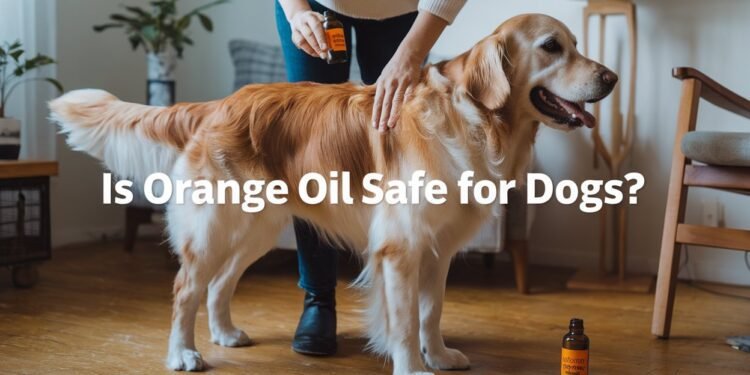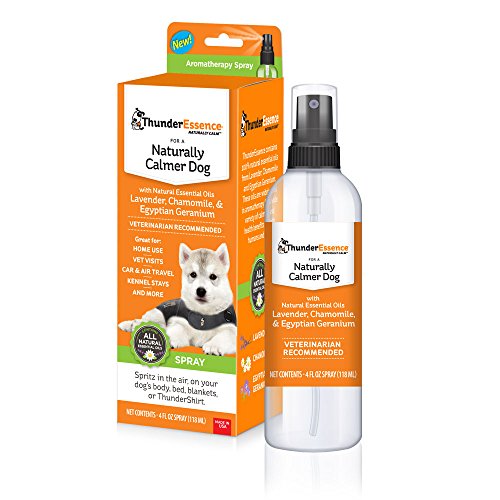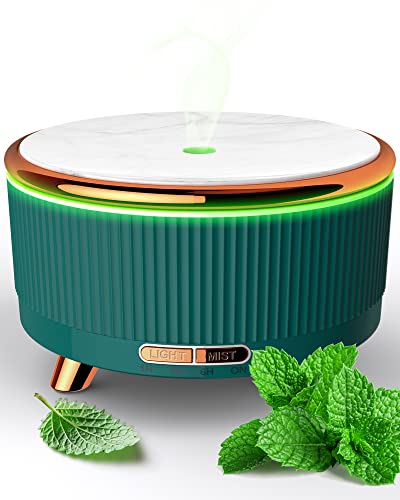Imagine a sunny Saturday afternoon with the air smelling of oranges. Your dog is happy, wagging their tail. This shows how nature can bring joy to both pets and owners.
But, as we use essential oils for our pets, we wonder if orange oil is safe. The scent of orange oil might seem good, but there are risks. It’s important to know both the good and bad sides of orange oil for dogs.
Understanding how essential oils affect dogs is key. This knowledge helps us make better choices for their health and happiness.
Table of Contents
Understanding Essential Oils and Dogs
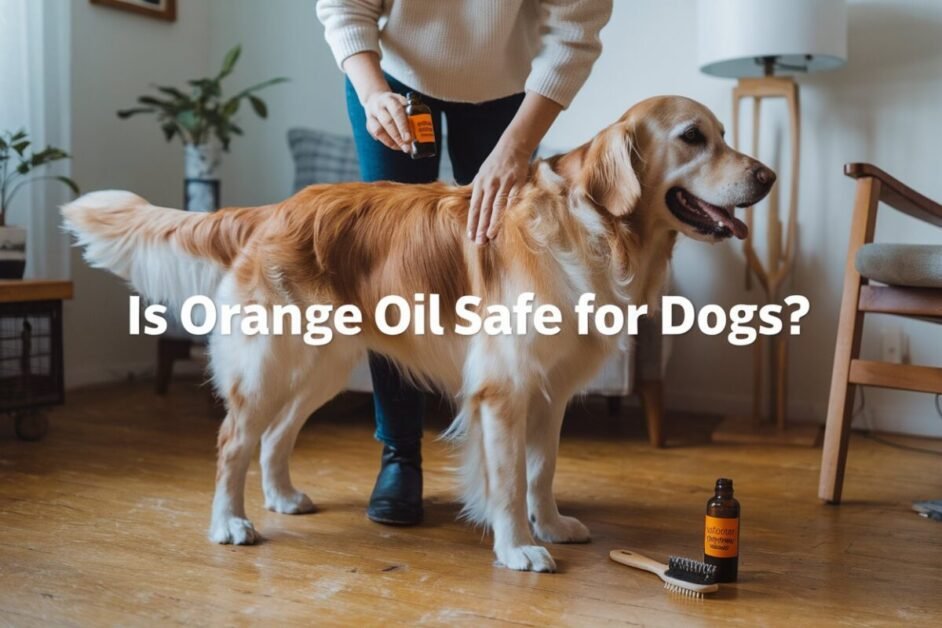
Essential oils are strong extracts from plants, known for their smell and health benefits. They are used by humans and in vet care. Understanding essential oils is key, especially for pet safety. Dogs have a much stronger sense of smell than humans, thanks to more olfactory receptors.
While essential oils are seen as natural, they can be dangerous for dogs. Some oils, like eucalyptus and peppermint, can cause serious health problems. These include liver damage and stomach issues.
But, some essential oils are good for dogs. Chamomile helps them relax, and ginger boosts their immune system. Orange oil is usually safe, but watch how different dogs react.
Essential oils are very strong, so even a little can harm dogs more than plants do. It’s important to use high-quality oils made for essential oils for pet safety. Products like 4-Legger’s are tested to be safe and effective for animals.
| Essential Oil | Safety for Dogs | Common Benefits | Toxicity Risks |
|---|---|---|---|
| Chamomile | Safe | Calm and relaxation | Minimal |
| Ginger | Safe | Immunity support | Minimal |
| Orange | Generally Safe | Variety of health benefits | Potential sensitivity in some breeds |
| Eucalyptus | Toxic | N/A | Liver and kidney issues |
| Peppermint | Toxic | N/A | Lethargy, vomiting, diarrhea |
| Tea Tree | Very Dangerous | N/A | Severe poisoning, possible fatalities |
| Lemongrass | Safe at specific dilution | Variety of health benefits | Possible irritation if undiluted |
What is Orange Oil?
Orange oil is a fragrant essential oil made from orange peels. It’s extracted through cold pressing, where pressure is applied to the fruit’s rind. This process releases the oils inside. Orange oil is known for its strong scent and health benefits.
In cooking, orange oil adds a fresh taste to many dishes. It’s also used in skincare for its uplifting smell and skin benefits. Plus, it’s in many eco-friendly cleaners because of its antibacterial properties.
Orange oil has compounds like b-Myrcene, which might help with pain and inflammation. Its scent is uplifting, which can improve mood. This makes it popular for natural pet care, encouraging owners to use it for their pets.
Orange oil is versatile and useful in many ways. But, it’s important to use it carefully, especially around pets. Dogs have a much stronger sense of smell than humans. Watching how they react to it is key to keeping them safe.
| Aspect | Description |
|---|---|
| Extraction Method | Cold pressing from orange peels |
| Main Uses | Culinary, cosmetic, household cleaning |
| Benefits | Mood enhancement, antiseptic properties |
| Key Component | b-Myrcene |
| Safety Consideration | Use only 100% pure essential oils |
| Usage Around Pets | Monitor reactions and avoid direct skin application |
Is Orange Oil Safe for Dogs?
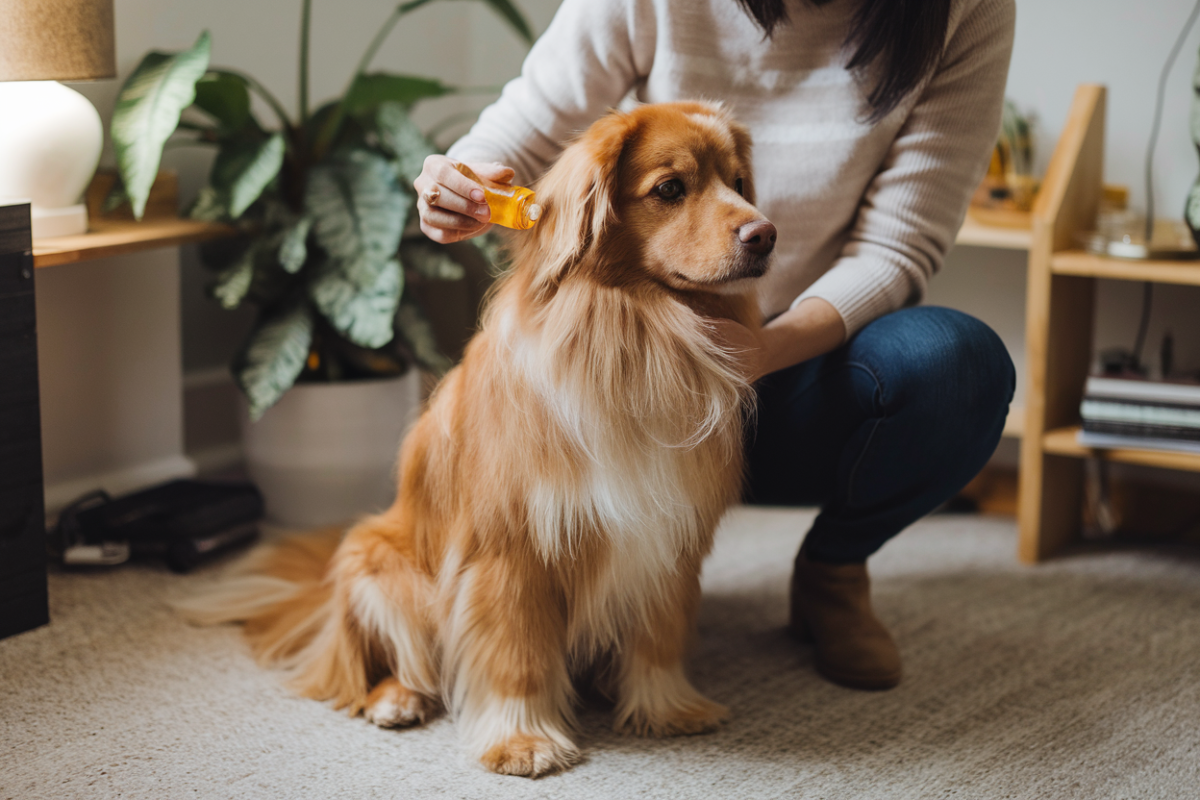
Understanding if orange oil is safe for dogs means looking at its good points and possible dangers. Orange essential oil can be helpful, but we must be careful. Dog owners often want to help their pets with natural remedies, so it’s key to know about using orange oil on pets.
Potential Benefits of Orange Oil for Dogs
Many pet owners are curious about orange oil’s benefits for dogs. This oil has antibacterial properties that might help with minor skin issues. It could also help with digestive problems if used correctly.
Orange oil contains b-Myrcene, which might help with pain and inflammation. This is good for dogs with arthritis or joint pain. Since dogs smell things much stronger than humans, we must use it carefully and in small amounts.
Common Uses in Dog Care
Orange oil can be used in different ways for pets. Here are some examples:
- Adding orange oil to natural cleaning products for your dog’s space.
- Making soothing balms with orange oil and Aloe Vera gel.
- Mixing the oil with water and vodka to make a refreshing spray for your dog’s favorite spots.
When using orange oil, watch your pet for any bad reactions. Signs like twitching noses or turning away mean it’s not working well. If your pet shows any negative signs, stop using it and talk to a vet. Knowing if orange oil is safe for dogs means weighing its benefits against these precautions.
Orange Oil Toxicity in Dogs
It’s important for pet owners to know about the dangers of orange oil toxicity in dogs. This oil, made from citrus fruits, has compounds that can harm dogs if they eat it or get it on their skin. Spotting the signs of toxicity early can help a lot in treating it.
Signs of Toxicity to Watch For
Pet owners need to watch for certain signs of toxicity in dogs from orange oil. The symptoms can change based on how much is ingested or absorbed. But common signs include:
- Vomiting
- Diarrhea
- Lethargy
- Dermatitis or skin irritation
- Difficulty breathing
- Muscle tremors
- Drooling
If you see any of these signs, act fast. Call a vet or animal control right away. Early action is crucial in dealing with essential oil poisoning. Treatment might include blood tests and IV fluids to help your pet recover.
To keep your pets safe, it’s important to prevent exposure. Make sure essential oils, like orange oil, are out of your pets’ reach. Also, keep any open containers tightly closed. Always talk to a vet before adding new products to your pet’s space.
Risks of Using Orange Oil on Pets
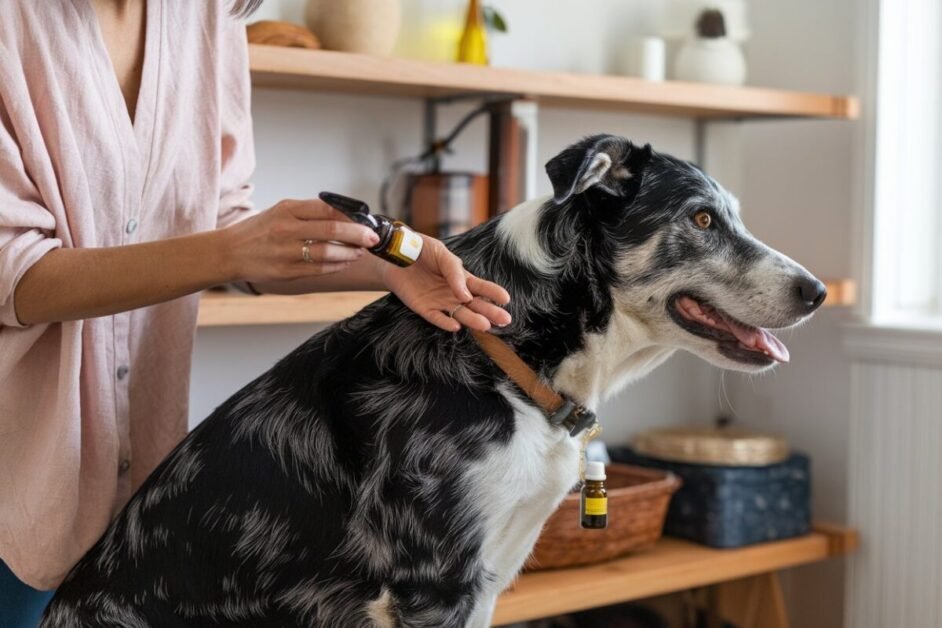
Using orange oil on dogs can be risky for pet owners. It’s important to know how to use essential oils safely around pets. Many essential oils haven’t been fully tested on animals, which can lead to harm.
Applying essential oils to the skin can cause irritation. They might also get into the bloodstream and harm organs. Giving them orally is even riskier, as it can cause stomach problems.
Vets may give different advice on essential oils, which can be confusing. Diffusing oils can irritate a pet’s respiratory system. Signs of toxicity can range from breathing problems to organ failure, so it’s important to watch closely.
- Sweet Orange Essential Oil contains toxic components such as linalool, alpha-pinene, limonene, and myrcene.
- Ingesting this oil can result in diarrhea, seizures, vomiting, weakness, or even coma.
- Safe essential oils for dogs include Cedarwood, Frankincense, and Turmeric Oil.
- While diffusing Sweet Orange Essential Oil may be safe for adult dogs, monitoring their sensitivity to the fragrance is essential.
Pet owners should make sure essential oils are pure and from trusted sources. Keeping them out of pets’ reach can help avoid many dangers.
- 100% PURE & NATURAL ORANGE OIL – Handcraft Blends oils are exactly that! Many oils being sold make that claim but are in…
- PREMIUM GRADE & QUALITY – All Handcraft Blends Essential Oils are tested by an independent lab to test the efficacy of e…
- HIGH QUALITY GLASS BOTTLE AND DROPPER – Our essential oil comes in an amber glass bottle to keep out UV rays and protect…

- 100% PURE & NATURAL SWEET ORANGE OIL- NaturoBliss oils are exactly that!! Many oils being sold online make that claim bu…
- PREMIUM THERAPEUTIC GRADE & PREMIUM QUALITY – All NaturoBliss Essential Oils are tested by an independent lab to test th…
- HIGH QUALITY GLASS BOTTLE W/ PREMIUM GLASS DROPPER – Our Brazilian Sweet Orange Essential Oil comes in an amber glass bo…

















- Sweet orange essential oil for diffuser. Orange essential oil for diffuser is a sweet, refreshing aromatherapy favorite …
- A citrusy touch to skincare. Orange essential oils for skin use may be used to promote the appearance of clear and smoot…
- DIYs never smelled so sweet. Orange oil essential lends a fresh aroma to Christmas-y gifts & DIY: soap making, roll-on p…

















- A SOOTHING & UPLIFTING SCENT. Orange essential oil for diffuser elevates atmospheres with its refreshing and invigoratin…
- NOURISHES & REJUVENATES SKIN. Sweet orange essential oils are often used in skin care for its potential benefits to nour…
- FLEXIBLE FOR DIY CANDLE MAKING SCENT. Orange oil essential infuses lasting freshness to homemade products like shampoo a…

















Dog-Friendly Essential Oils
Choosing the right essential oils for your dog is key. These oils can make your pet’s life better while keeping them safe. Lavender, chamomile, and ginger are some of the best options.
Essential Oils Generally Safe for Dogs
Lavender oil helps calm anxious dogs. Chamomile oil has anti-inflammatory effects and aids in healing. Ginger oil is good for digestion and breathing.
- Lavender: Calming effects for anxious pets.
- Chamomile: Anti-inflammatory properties that soothe injuries.
- Ginger: Supports digestion and respiratory health.
Valerian and marjoram also help with stress. But, always dilute essential oils to avoid harm. Even though lavender and chamomile are safe, always check with your vet first.
Knowing which essential oils are safe for dogs helps keep them healthy and happy. It’s all about using them wisely.
Precautions with Citrus Oils for Dogs
Using citrus oils around dogs needs careful thought because they can be harmful. These oils smell nice and might help, but they have parts like limonene. This can make dogs vomit and feel sad. It’s key to know how to use citrus oils safely to keep your pets safe.
How to Properly Use Citrus Oils Around Pets
To use citrus oils safely around pets, follow these steps:
- Dilute Oils: Always mix citrus oils with a carrier oil before using them on pets or in their space. This makes the oils less strong and safer.
- Ventilation: Make sure places where you use citrus oils have lots of air. Good air flow can make the smell of the oils less strong, which is better for dogs.
- Monitor Behavior: Keep an eye on how your dog acts after using citrus oils. If they drool a lot, vomit, or seem really tired, it might be a sign they’re not okay.
- Secure Storage: Keep all citrus oils where pets can’t get to them. This stops them from getting into the oils by accident.
- Consult a Veterinarian: Talk to a vet before using citrus oils. They can tell you the best way to use them and suggest other options that are safer for your dog.
By following these steps, you can make using citrus oils safer for your pets. When done right, it can make their living space healthier and happier.
Natural Remedies for Dog Care
Many pet owners are now using natural remedies for their dogs. These remedies help support their pets’ health along with vet treatments. Natural remedies often use herbal treatments for dogs like essential oils, which have been used for thousands of years.
Essential oils offer many benefits. For example, lavender essential oil helps calm anxious dogs. Frankincense oil helps dogs relax and stay well. Peppermint essential oil eases muscle pain. Each oil has a special purpose to improve a dog’s life.
Using oils like cedarwood and lemongrass can keep fleas and ticks away. Rosemary essential oil also protects against these pests. Some oils, like cardamom essential oil, help with digestion issues.
| Essential Oil | Benefits | Uses |
|---|---|---|
| Lavender | Calming properties | For anxious or stressed dogs |
| Frankincense | Promotes relaxation | Overall wellness |
| Peppermint | Relieves muscle soreness | For aching joints |
| Cedarwood | Bug-repelling | Flea and tick solutions |
| Lemongrass | Natural insect repellent | Arthritis support |
| Cardamom | Settles stomach, supports respiration | Nausea and cough treatment |
| Oregano | Antibacterial and antiviral | Natural antibiotic alternative |
Research shows essential oils might work better than antibiotics for some issues. Studies from Johns Hopkins University found oils like oregano and clove fight infections well. Pet owners should think about adding these natural remedies to their dog’s care for extra health benefits.
When using herbal treatments for dogs, safety and the right amount are key. Working with a vet who knows about holistic care is important. These natural solutions can help your dog feel better and work well with vet treatments.
- Our 7 special essential oils, rarely found in sets, are selected for dogs, cats & house pets as well as the whole family…
- Improve your Emotional, Spiritual & Physical Wellness! Experiment and enjoy the numerous benefits of Essential oils! Fre…
- VANILLA: Sweet aroma used in perfums, Uplifts mood. GINGER: Warm, spicy & energizing oil, Among the many great oils to c…

















- Our 7 special essential oils, rarely found together in sets, are selected for dogs, cats & house pets as well as the who…
- Experiment and enjoy the numerous Essential oils in your Pastel Set! Freshen up the scent of any room and set the desire…
- ROSE essential oil will give your home a pleasant scent. The fragrance of CHAMOMILLE oil generate a sense of calm. THYME…

















- PET CARE: Unleash the Natural Brilliance of Your Pet’s Coat with Wagging Tails Soothing Oil: Harnessing the Power of Coc…
- VITAMIN E ENRICHED: Enhances coat and promotes skin health, It nourishes and moisturizes their skin, ideal for pets with…
- HAIR FALL CONTROL: Our soothing oil Strengthens hair roots, reducing unwanted hair loss and leaving your pet’s coat look…

















- Natural Pet Care: Specially formulated for pets, these essential oils enhance relaxation and stress relief.
- Versatile Collection: Includes Cedarwood, Chamomile, Frankincense, Ginger, Lavender, and Rosemary to suit various pet ne…
- Safe for Pets: Vet approved, suitable for both dogs and cats, providing a gentle yet effective aromatherapy experience.
Dosage Recommendations for Orange Oil
When using orange oil, diluting it correctly is key. For dogs, mix one to five drops of orange oil with 100 drops of carrier oil. This helps avoid bad reactions and keeps the oil working well. Cats, being more sensitive, should get up to two drops of essential oil per 100 drops of carrier oil.
When applying orange oil topically, target areas like the back of the neck or shoulders. This avoids sensitive spots. Always stick to the recommended amounts to avoid toxicity. Animals are more sensitive to essential oils than humans, so be careful.
It is important to consult a veterinarian before using orange oil and other essential oils, especially if your pets have known health issues.
Using essential oils in homemade sprays can be helpful. For a calming spray, blend 20 drops of lavender and 20 drops of frankincense with 2 ounces of water or fractionated coconut oil. This method reduces exposure while still offering benefits.
Always use essential oils safely. If your dog is under 8 weeks old or you’re unsure about using essential oils, talk to your vet. Following these tips helps ensure your pet’s health and happiness.
Side Effects of Orange Oil in Dogs
Using orange oil on dogs can have its challenges. It’s important for pet owners to know the side effects. This way, they can keep their dogs safe and healthy.
Skin irritation is a common problem. Dogs might get red or itchy where the oil is applied. Allergic reactions can also happen, causing swelling, hives, or trouble breathing.
Gastrointestinal upset is another big worry. If dogs eat too much orange oil, they might vomit or have diarrhea. Even a little bit can upset sensitive pets. Neurological problems, like feeling tired, shaking, or having seizures, can also occur if the oil is used wrong.
It’s key to watch for any changes in dogs after using orange oil. Here’s a quick list of possible side effects:
| Side Effect | Description |
|---|---|
| Skin Irritation | Redness or itchiness in areas of application. |
| Allergic Reactions | Swelling, hives, or difficulty breathing. |
| Gastrointestinal Upset | Vomiting or diarrhea, particularly if ingested. |
| Neurological Disturbances | Lethargy, tremors, or seizures may occur. |
Knowing about these side effects helps pet owners make better choices. Keeping pets safe and healthy is always the top priority when using essential oils like orange oil.
Consulting Your Veterinarian
Before making any changes to your dog’s care routine, it’s crucial to prioritize their safety. Talking to a vet about essential oils can give you specific advice. They can help identify any sensitivities or allergies your dog might have.
If you’re thinking about adding essential oils to your pet’s routine, talking to your vet is key. They can discuss safety and alternative therapies that might help your dog. Since each dog reacts differently, getting professional advice is very important.
When using essential oils, start with small amounts. It’s recommended to mix 1 drop of essential oil with 1.5 tablespoons of carrier oil. This makes a weak solution of about 0.25%. This way, you can watch for any bad reactions in the first 30 minutes to 24 hours.
Getting your vet’s approval can help you choose safe essential oils for your dog. They might suggest oils like chamomile and frankincense. It’s also important to pick the right carrier oils, like coconut or jojoba oil.
| Safety Guidelines | Description |
|---|---|
| Consult a Veterinarian | Get advice tailored to your dog’s health history. |
| Introduce Gradually | Start with small amounts and watch for reactions. |
| Use Safe Oils | Chamomile, frankincense, and ginger are often safe for dogs. |
| Carrier Oil Selection | Consider coconut oil, jojoba oil, or borage seed oil. |
| Watch for Reactions | Look out for signs of irritation like coughing or upset stomach. |
Keeping your pet safe is more important than any benefits from alternative therapies. By talking to a vet about essential oils, you can make sure your dog is safe. This way, you can explore natural options for their care without risk.
How to Tell if Essential Oils Are Safe
It’s important for pet owners to know if essential oils are safe for their pets. Many essential oils can harm animals. Before using them, do thorough research on the specific oils.
Always check the labels for warnings or things to avoid. This helps you understand if a product is safe for your pets.
Choosing oils that are known to be safe for dogs is a good start. For example, orange essential oil is usually okay for dogs unless they have certain sensitivities. Watch your pets closely when introducing new products.
If you notice any unusual behavior, like too much drooling or lethargy, it could be a sign of a problem. This means your pet might be reacting badly to the oil.
Using high-quality essential oils can reduce the risk of harm. Brands like 4-Legger make sure their oils are safe for animals. This makes it safer to add essential oils to your routine.
But remember, always be careful when introducing new things to your pets. Their health and happiness should always come first.
- CALMING ESSENTIAL OILS: These oils have been specifically made for dogs to reduce anxiety and decrease stress at home, o…
- SOOTHING AROMATHERAPY: All 100% natural blend of essential oils Lavender, Chamomile, and Egyptian Geranium that are para…
- VETERINARIAN RECOMMENDED: ThunderEssence is pH balanced and safe for dogs to use daily or as needed through all of life’…

















- FULL & SHINY FUR COAT – Multifunctional skincare formula for all skin & hair types. In easy to use, single-use pipettes….
- NATURAL INGREDIENTS – Contains 10 essential oils. Hemp & neem oils, Omega-3 & 6 fatty acids with Vitamin E. Deodorizes o…
- VETERINARIAN RECOMMENDED – For pets that suffer from dry or flaky skin. Works to restore natural hydration levels within…
Essential Oil Diffusers and Pet Safety
Essential oil diffusers can make a room feel calm, but they must be safe for pets. Dog owners need to make sure the scents in the air won’t harm their pets. With more people using natural remedies, pets are getting sick from essential oils more often.
It’s important to keep pets away from strong smells. Make sure they have fresh air. Watch how your dog acts when you use a diffuser. Dogs can smell things much stronger than humans.
Some essential oils are bad for dogs. Oils like pennyroyal, peppermint, and tea tree oil can be harmful. Signs of trouble include feeling tired, throwing up, and breathing problems.
To keep pets safe, choose safe oils for diffusers. Oils like lavender and chamomile are okay for dogs.
Always talk to a vet before using essential oils around pets. This step keeps your pets safe and helps you pick the right oils.
| Essential Oil | Safe for Dogs | Toxic to Dogs |
|---|---|---|
| Myrrh | ✔ | ✘ |
| Frankincense | ✔ | ✘ |
| Lavender Oil | ✔ | ✘ |
| Pennyroyal | ✘ | ✔ |
| Tea Tree Oil | ✘ | ✔ |
- Low Noise & Sleep Better: Adopted noise reduction technology, ultrasonic diffuser operates quietly with no water drippin…
- 500ML Diffuser, Ideal for Large Room:The covering area reaches up to 480 ft², which can use in a large room.Enjoy up to …
- Superior Safety:You can keep this aromatherapy diffuser on at night, no need to worry about overheating because of the a…

















- Compact and Versatile – Our small oil diffuser is designed to be compact and versatile, making it suitable for various s…
- All-in-One Button – Experience convenience at its best with our ultrasonic diffuser, designed with a user-friendly one-b…
- Enhanced Night Light – Our compact portable diffuser that features eight lights, including a unique warm yellow light. T…

















- Aromatherapy and Salt Therapy – Our 2-in-1 Himalayan salt lamp and essential oil diffuser combines the therapeutic prope…
- 100% Pure Himalayan Pink Salt Rock – This salt lamp diffuser come with a pack of unprocessed Himalayan pink salt crystal…
- Eye-Catching Simulation Flame Effect – Salt therapy lamp and aromatherapy diffuser with flame is such unique concept and…

















Cost-Effective Alternatives to Orange Oil
Many pet owners look for cost-effective alternatives to orange oil for their dogs. They want to keep their pets clean and safe. Luckily, there are many options that work well.
Herbal infusions are a great choice. For example, lavender and peppermint essential oils are safe for dogs. Just make sure to dilute them properly.
DIY cleaning solutions are also a good idea. Here are some recipes:
- Coconut oil mixed with lavender or cedarwood oils creates a refreshing atmosphere for pets.
- Organic vinegar mixed with water is a safe and effective cleaner.
- Herbal teas like chamomile or mint can help relax your dog.
There are also affordable dog care remedies. Baking soda paste can deodorize areas. Simple soap solutions can clean surfaces without breaking the bank.
| Alternative Solution | Application | Safety for Dogs |
|---|---|---|
| Lavender Oil (diluted) | Topical application or diffuser | Safe when diluted 1:100 with a carrier oil |
| Peppermint Oil (diluted) | Topical application | Safe when diluted 1:100-150 |
| Vinegar | Cleaning agent | Completely safe |
| Coconut Oil | Topical application | Safe for dogs |
| Herbal Teas | Soothing infusion | Safe for dog consumption in moderation |
Exploring affordable dog care remedies helps keep pets healthy and safe. These alternatives make pet care safe and budget-friendly. They show that caring for your dog doesn’t have to be expensive.
- SOOTHES AND CALMS DRY OR IRRITATED SKIN: Our soothing citrus pet shampoo contains high quality natural ingredients inclu…
- ALL NATURAL INGREDIENTS: Our all plant-based shampoo is made with the most effective yet gentle cleaning agents found in…
- PROFESSIONAL GRADE QUALITY: Our citrus shampoo offers safe professional quality for dogs, cats, puppies, and kittens wit…

















- NATURAL INGREDIENTS THAT MAKE SENSE: 4Legger organic dog shampoo is ceritifed to organic food standards, a true all natu…
- RELIEF FOR SENSITIVE SKIN: 4-Legger hypoallergenic dog shampoo is made with organic oils, lemongrass and aloe. We don’t …
- THE CHOICE FOR ECO-CONSCIOUS PET PARENTS: 4-Legger dog shampoo is made from sustainably sourced, all natural ingredients…

















- HYDRATE & DESHED & SAVE TIME: Keep your pet clean and soft with our NEW Hempz Petz Creamy Citrus Orange & Red Raspberry …
- SCENT: A fresh & fruity citrus explosion that you and your pet will love
- EASY DOES IT: Formulated specially for dogs that shed frequently

















- Premium Orange Cream Oil: Good Essential offers premium-grade fragrance oils. Our delightful orange cream scent is absol…
- Durable Amber Glass Packaging: Encased in a robust 1-ounce amber glass bottle, our orange cream fragrance oil ensures ea…
- Versatile Aroma For Any Diffuser: Enhance your space by adding a few drops of this Orange Cream scent oil also known as …

















Products Containing Orange Oil for Dogs
When looking for safe pet products, it’s key to find those with orange oil made for dogs. A good example is 4-Legger’s USDA Organic Neem Dog Shampoo. It has sweet orange essential oil and is safe for dogs.
- 💚 ORGANIC DOG SHAMPOO – 4-Legger Neem dog shampoo with sweet orange is made with all organic ingredients from plants. No…
- 🍃 100% NATURAL DOG SHAMPOO – Safe and non-toxic organic neem dog shampoo with sweet orange essential oil with the best c…
- 🐶 #1 CHOICE FROM HOLISTIC VETERINARIANS AND PROFESSIONAL GROOMERS – Since 2015, industry leaders have recognized 4-Legge…

















Always check if a product with orange oil for dogs is safe by a vet. Look for certifications that show it’s okay for dogs. Also, check the ingredients to avoid harmful stuff, as some oils can be toxic.
Remember, essential oils need to be diluted, like 1% or less for skin use. Watch how your dog reacts after using it. Dogs can be more sensitive to smells than people. By choosing safe products and being careful, you can use orange oil safely with your dog.
FAQ
Is orange oil safe for dogs?
Orange oil is not safe for dogs. It has some benefits, like fighting bacteria. But, it can also cause skin problems and be toxic if swallowed.
What are the potential benefits of orange oil for dogs?
Orange oil can help with minor skin issues and stomach problems. It’s also used in cleaning and as a natural deodorizer.
What symptoms indicate orange oil toxicity in dogs?
Signs of orange oil toxicity include vomiting, diarrhea, feeling tired, and skin problems. Seeing these signs fast is key to getting help.
How can I use orange oil safely around my dog?
To safely use orange oil, mix it well and make sure the area is well-ventilated. Watch your dog for any changes in behavior after use.
What are the risks associated with using orange oil on pets?
Risks include skin irritation, allergic reactions, and stomach problems if swallowed. Essential oils, especially concentrated ones, are very dangerous.
Which essential oils are generally considered safe for dogs?
Safe oils for dogs are lavender, chamomile, and ginger. But, always dilute them and talk to a vet before using.
What precautions should I take when using citrus oils like orange oil around dogs?
Be careful by diluting citrus oils and keeping them away from pets. Watch your dog closely when using these oils.
Are there natural remedies that I can use instead of orange oil for my dog?
Yes, you can use herbal treatments like chamomile or lavender. They help relax your dog and improve their skin.
How should I administer orange oil to avoid toxicity in dogs?
Dilute orange oil well and use it in cleaning products, not on your dog’s skin. Always check with a vet before using any essential oil.
What side effects should I watch for after my dog is exposed to orange oil?
Look out for skin problems and allergic reactions. Severe symptoms like stomach issues or brain problems are also possible, so keep a close eye.
Why is it important to consult a veterinarian before using essential oils for dogs?
Talking to your vet is crucial to make sure the oil is right for your dog. They can give you personalized advice on safe use.
How do I determine if an essential oil is safe for my pet?
Research the oil thoroughly and read labels for warnings. Choose oils that are known to be safe for dogs and watch your pet’s reaction.
Are essential oil diffusers safe to use around dogs?
Diffusers can be safe if the oils used are not harmful to dogs. Make sure to ventilate well and use them for short periods.
What are some cost-effective alternatives to using orange oil for dog care?
Consider herbal infusions and DIY cleaning solutions with safe essential oils. They are cheaper and still keep your dog clean and healthy.
Are there commercial products containing orange oil that are safe for dogs?
Yes, there are products with orange oil made for safe use around dogs. Always check for certifications and read the ingredient list to ensure safety.
















